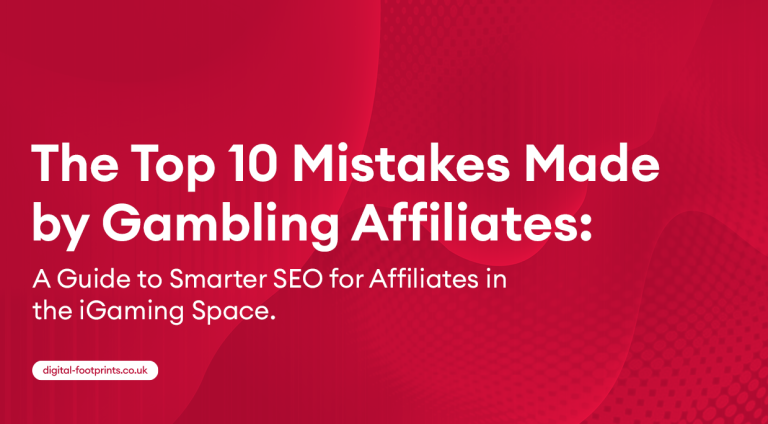Affiliate marketing spans across a huge range of industries. However, its relationship with gambling is particularly strong and, as a result, competition can be fierce. To carve out a niche and be a success as a gambling affiliate, avoiding SEO mistakes is paramount.
In this guide, we highlight 10 common SEO mistakes that we see time and time again. Read on to check them out and ensure you’re not repeating them in your affiliate campaigns and content.
Ignoring User Intent
When it comes to keyword targeting, it can be easy to opt for broad keywords with high traffic volumes. After all, the more people your content reaches the better, right? Not quite. This approach runs the risk of overlooking or even completely ignoring user intent.
When you’re creating content of any kind, thinking about user intent is essential. Whether a user’s intent is informational, transactional or commercial, it’s imperative that your content provides whatever answers they’re looking for.
Low-Value Content
This follows on from the point about user intent. Let’s say you’ve found some high-value, low-competition keywords. You might be tempted to throw together some content around these keywords without much thought. However, doing so will not make the most of the keywords you’ve worked so hard to identify.
Search algorithms don’t just look for content with the best keyword optimisation. They look for content that provides actual value for users. If you’ve written a poorly-spelled blog that doesn’t actually say much, it’s not going to perform as well as it should, no matter how fantastic your keyword research has been.
Provide valuable, actionable information that users will appreciate. This won’t just help a singular piece of content rank, it will give a boost to your overall brand and help establish you as an authority voice.
Keyword Stuffing
Back in the early days, when black hat SEO strategies were rife, keyword stuffing was a widely used trick. As the name suggests, this approach involves cramming as many keywords into a piece of content as possible.
While this might have worked way back when search algorithms were less sophisticated, it certainly won’t now. In fact, keyword stuffing will actively harm your content and your platform, making it seem untrustworthy in the eyes of search engines like Google.
Don’t write for the algorithm. Write for the user instead. Make your content readable and easy to digest. This will give you a huge boost in search results.
Overlooking Technical SEO
When people talk about SEO, the focus is usually on keywords, format and value. While these are undoubtedly important, they should never come at the expense of technical SEO.
For those new to the world of SEO, it might come as a surprise to learn that the technical performance of a site can have an impact. Things like slow loading speeds, poor mobile optimisation and broken links can all have a detrimental effect.
Running regular technical audits can help you stay on top of these issues. You’ll be able to spot problems early and address them before they start to pile up.
Weak Internal Linking
When Google looks at a website, it follows links to understand the website’s structure and how different pages relate to each other. If your site doesn’t have these internal links, search engines will struggle to properly evaluate your platform, and your rankings will suffer as a result.
Review your content and ensure you have a logical chain of internal links that allow users, or Google, to flow throw your site with ease.
Ignoring Schema Markup
The way your content appears in SERPs can have a big impact on whether or not a user actually clicks on it. Think about a Google results page; some links will provide extra information along with the description, such as prices and ratings. This is schema markup in action.
You can use schema markup and structured data to improve how your content appears in SERPs, with everything from FAQs to reviews and offers.
Failure to Localise
It can be easy to assume that one well-written piece of content will perform in the same way across multiple regions. Unfortunately, this isn’t the case, and a failure to properly localise is one of the most common SEO mistakes we see.
Gambling markets have huge differences from one country to another. Understanding these differences is key, both to maximise results and to ensure you are not in breach of any local laws. Examples include responsible gambling messaging requirements in the UK, bonus restrictions in Sweden and payment method preferences in LatAm.
Compliance Issues
Compliance is essential for iGaming SEO. Affiliates who overlook compliance run the risk of facing serious punitive action, not to mention reputational damage that can be hard to recover from. Some of the most common compliance SEO mistakes we see include using misleading language, promoting unlicensed operators and failing to display responsible gambling messaging and disclaimers.
Delivering compliance-first content doesn’t just protect your brand, it also helps to build long-term trust and can help establish you as a safe, reputable choice for players.
Forgetting Authority Links
For affiliate content to be picked up consistently by Google, it needs to offer experience, expertise, authority and trustworthiness, often shorted to EEAT. While the quality of your content is key to demonstrating EEAT, including authority links can also give it a boost.
Authority links are an easy, but often overlooked, SEO tactic that can tell Google to treat your site as a reliable resource. Mix up your authority links and link out to credible sources like gambling commissions, regulatory bodies or responsible gambling organisations.
Out-of-Date Content
Few things undermine trust faster than an affiliate page featuring expired offers. In iGaming, promotions, odds, and regulations change constantly. Neglecting updates means poor user experience, missed opportunities and lower rankings.
Regularly audit and refresh old pages to ensure they’re up to date. Make sure all your links are working too, broken links can have a serious impact on SEO performance.
Final Thoughts
Avoiding these SEO mistakes isn’t just about climbing search rankings, it’s about building a sustainable affiliate brand in fiercely competitive industry. From understanding user intent to staying compliant, each step helps you deliver content that search engines trust and players rely on.
If you want to take your affiliate SEO to the next level, Digital Footprints is here to help. With over a decade of iGaming experience, we know what it takes to rank, convert and stay compliant. Get in touch and let’s build content that wins.





